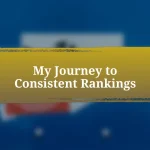Key takeaways:
- Fantasy sports transform fan engagement by allowing participants to manage virtual teams based on real player performances, fostering emotional investment and community.
- They enhance strategic thinking, social connections, and sports knowledge, turning casual fans into more analytical participants.
- Effective resource evaluation is crucial, emphasizing credible sources, in-depth analysis, and user-friendly platforms for making informed decisions.
- Utilizing multiple sources and engaging with the community can enhance insights, while balancing data with personal intuition leads to better outcomes.
Author: Clara Whitmore
Bio: Clara Whitmore is an acclaimed author known for her compelling narratives and rich character development. With a background in psychology and literature, she weaves intricate tales that explore the complexities of human relationships and the nuances of the human experience. Clara’s debut novel, “Echoes of the Past,” garnered critical acclaim and was a finalist for several literary awards. She holds an MFA in Creative Writing from the University of Iowa and frequently conducts workshops and lectures on storytelling. When she’s not writing, Clara enjoys hiking in the mountains and experimenting with new recipes in her kitchen. She lives in Portland, Oregon, with her two rescue dogs and a well-stocked bookshelf.

What are Fantasy Sports
Fantasy sports are a thrilling way for fans to engage with their favorite sports in a different light. Participants act as team managers, drafting real-life players to create their virtual teams based on those players’ performances in actual games. It’s almost like a strategic game of chess, where your decisions can lead to victory or disappointment each week.
I still remember the rush I felt the first time I joined a fantasy football league. Each Sunday, as I moved closer to winning, the excitement was palpable. It became more than just following the game; I was emotionally invested in every tackle and touchdown. Have you ever felt that connection with a player, rooting for their success even beyond your team? That’s the beauty of fantasy sports— they transform your viewing experience into a personal journey filled with highs and lows.
At its core, fantasy sports are not just about statistics; they are about community and competition. Whether you’re competing against friends or strangers, the camaraderie that develops is palpable. Wouldn’t you agree that sharing your fantasy highs and lows with others brings a sense of belonging? It’s this unique blend of competition and community that keeps millions engaged season after season.

Benefits of Playing Fantasy Sports
Engaging in fantasy sports offers a thrilling way to sharpen your strategic thinking. It’s not just about picking players; it’s about analyzing stats, understanding matchups, and predicting performance. I remember sitting with friends, poring over player stats late into the night, weighing my options like a real-life general preparing for battle. Can you recall a time when a last-minute change in your lineup turned the tide of your week?
Another fantastic benefit is the social aspect. When I joined my first league, it felt like a new world opened up—suddenly, I was part of a vibrant community where banter flowed freely. Whether it’s trash-talking in a group chat or celebrating a big win together, these moments foster friendships that extend beyond the sports season. Isn’t it wonderful how something as simple as a shared interest in fantasy sports can create lasting connections?
Lastly, there’s the educational component. As I dove deeper into fantasy sports, I found myself becoming more knowledgeable about the game itself, including player stats, injuries, and strategies. This deeper understanding enriched my overall sports experience, transforming me from a casual fan to a more analytical one. Have you ever felt that excitement of discovering new layers to your favorite sport? Fantasy sports encourage that exploration, leading to both personal and sports-related growth.

Popular Types of Fantasy Sports
Fantasy sports come in various flavors, each catering to different interests and preferences. One of the most popular types is fantasy football, which captures millions of fans each season. I remember my first fantasy football draft—the excitement of strategizing to build a dream team was unmatched. Did you ever find yourself losing track of time while ranking players based on their potential? It’s exhilarating to see your choices play out on the field.
Another exciting format is fantasy basketball, where the fast-paced nature of the sport makes for dynamic gameplay. The thrill of watching nightly games to see if my players perform as expected always keeps me on the edge of my seat. Have you ever celebrated a game-winning shot that helped your fantasy team edge out the competition? Those moments create a rush that’s hard to replicate.
Then there’s fantasy baseball, which adds a unique twist with its long season and daily lineups. I often cherish the moments spent analyzing player matchups and making strategic tweaks based on pitcher performances. Isn’t it fascinating how a single game can significantly influence your fantasy standings? With each season, I dive deeper into the stats, and I find myself learning more about the sport I love.

Top Sources for Fantasy Insights
To truly excel in fantasy sports, I’ve identified some top sources that provide valuable insights. One of my go-to resources is fantasy sports websites like ESPN and Rotowire. They offer comprehensive player rankings, injury updates, and expert analysis that I often rely on when finalizing my lineup. Have you checked their predictions against your own strategies? It can be enlightening to see how different perspectives might challenge or confirm your decisions.
Podcasts are another fantastic resource for fantasy insights. I remember listening to a show while driving to work; the hosts dissected player performances and made bold predictions for the upcoming week. It’s entertaining and informative, creating a sense of community while also enhancing my strategic thinking. Have you ever found a podcast episode that completely reshaped your viewpoint on a player? That’s the kind of resource that adds depth to your game.
Social media channels, particularly Twitter, are invaluable for real-time updates and expert chatter. I often scroll through updates during lineup decisions, soaking in opinions and strategies from analysts and fellow players alike. The immediacy of information can significantly impact your decision-making. Ever made a last-minute change based on a tweet? Those small adjustments can make all the difference in close matchups, underscoring the importance of staying informed.

Evaluating Fantasy Sports Resources
When evaluating fantasy sports resources, I always consider the depth of their analysis. Take for example a resource that offers not just rankings but also insights into player matchups and historical performances. These situational analyses have helped me make tough decisions, like starting an underdog player during a challenging week. Isn’t it rewarding to see that research pay off with a solid performance?
Another factor I weigh heavily is the credibility of the source. I’ve learned the hard way that not all opinions are created equal. One time, I relied on an online forum for advice, only to discover later that many of those contributors were not as experienced as they claimed. That experience taught me to prioritize expert opinions and reliable statistical data over casual suggestions. Have you ever had a similar experience that led you to rethink your sources?
Lastly, I find it crucial to assess the user experience of the resources I’m using. A well-organized website or app can make all the difference when you’re in a time crunch. I vividly recall a playoff week where I was juggling work and lineup decisions. Finding a resource that offered easy navigation and quick access to the information I needed was like striking gold. How do you ensure that your resources support your fantasy strategy rather than hinder it? It’s an essential aspect that shouldn’t be overlooked.

My Personal Favorite Platforms
One of my favorite platforms for fantasy insights is FantasyPros. The way they aggregate expert opinions and provide consensus rankings has made my decision-making so much easier. I remember one season when I was torn between two players, and their consensus analysis led me to start the underdog, who ended up exceeding all expectations. Isn’t it nice when tools can guide you through tough choices?
Another resource I often turn to is Rotowire. Their in-depth articles often highlight key player injuries and game-time decisions that otherwise might slip under my radar. Just last year, I narrowly dodged a bullet when they provided a last-minute update on a player I was ready to start; that saved my lineup from a potential disaster. How often do we overlook that crucial information until it’s too late?
Finally, I can’t overlook ESPN Fantasy. Its user-friendly interface makes managing my team a breeze. I once faced an unexpected family emergency on the day I had to finalize my lineup. The ease of navigating their app allowed me to make quick yet informed decisions, keeping my team competitive. Do you have a go-to platform that saves you in moments like these?

Tips for Using Fantasy Insights
When utilizing fantasy insights, it’s crucial to cross-reference multiple sources. I recall a time when I relied solely on one site for stats, only to miss out on pivotal player updates from another source. It made me realize how important it is to have a well-rounded perspective—have you ever had a similar experience where the lack of information cost you a win?
Engaging with the community can amplify the usefulness of fantasy insights. I’ve participated in forums where other players share unique takes or breaking news that I hadn’t considered. Those discussions often spark ideas that lead me to make surprising yet beneficial lineup changes. It makes me wonder: how often do we overlook the power of shared knowledge?
Finally, trust your instincts, but let data guide you. I remember a week when I was set to bench a player because his stats didn’t look great, yet my gut told me to keep him in. I eventually did, and he delivered a stellar performance that week. Balancing analytical insights with your own judgment is key; after all, how often have you second-guessed a decision only to regret it later?














